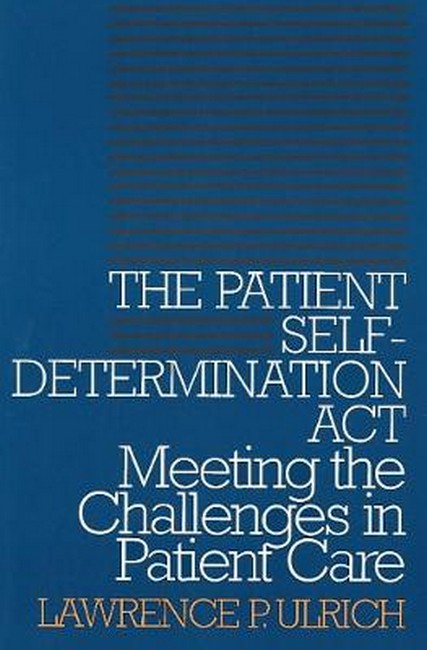Introduction 1. The Requirements of the Patient Self-Determination ActThe Explicit Demands of the LawThe Spirit of the Law 2. The Legal Background of the Patient Self-Determination ActEthics and the LawThe Case of Karen Ann QuinlanThe Case of William BartlingThe Case of Paul BrophyTHe Case of Nancy CruzanGeneral Implications 3. The Social and Technological Background for the Patient Self-Determination ActThe Expectations of HealthcareThe Physician-Patient RelationshipThe Technological Pressures on Healthcare DeliveryThe Difficulty of Limiting Technology in HealthcareHealthcare Costs and the Demands of Justice 4. The Human Context of the Patient Self-Determination ActThe Recognition of Human FinitudeThe Asseriotn of Personal DignityThe Role of the Virtues in Conducting the Moral Life 5. The Institutional Context of the Patient Self-Determination ActThe Social Obligations of InstitutionsThe Mission of the InstitutionHealthcare Institutions as Center of Education 6. The Ethical Foundations of the Patient Self-Determination ActThe Supporting Principles of BioethicsThe Role of the Virtues in Clinical DecisionsInformed ConsentDecisional CapacityThe Right to Refuse TreatmentDemands for TreatmentClinical FutilityAn Integration of Ethical Issues 7. Advance DirectivesThe Nature of Advance DirectivesThe Social Justification for Advance DirectivesGeneral Problems with Advance DirectivesAdvantages and Disadvantages of Advance DirectivesWriting an Advance DirectiveContent of Advance DirectivesAssistance in Writing Advance Directives 8. The Roles of Healthcare ProfessionalsPreparing the ProfessionalThe Role of the PhysicianThe Role of Social Services and ChaplaincyThe Role of NursingPerspective 9. The Role of the Responsible PatientSetting the StageThe Moral Responsibility for Making DecisionsDeveloping a Life of VirtueEssential Virtues of the Responsible PatientSummary Conclusion Index
Request Academic Copy
Please copy the ISBN for submitting review copy form
Description
"An Inspiring Delight! Marion Crook shares her personal view of writing, from years of Writing, publishing and teaching, in such a lively style that readers are immediately drawn into the whole process. She cleverly shares her own experiences, second thoughts, and viewpoints--all highlighted with practical examples and quotes. A strong section is the examination of the craft of writing, focusing on increasing skills to plot the action, development, conflict, and turning points along with increasing the depth, creditability and speech of characters. Crook s work is unique in presenting a broad scope of the field of literature forchildren--writing, rewriting, publishing and promotion. Experienced writers will gain valuable tips and insights as they reflect on their own endeavors. This book is not just valuable for writers, as parents, teachers and educators will find that it offers a unique insight into what is a good book for children! The specific suggestions for writers (character development, plot structure, voice) will resonate with adult readers wishing to heighten their awareness of the qualities to be found in fine writing for young people." Dr. Ronald Jobe, Professor Emeritus, Department of Language & Literacy Education, Faculty of Education, University of British Columbia"

